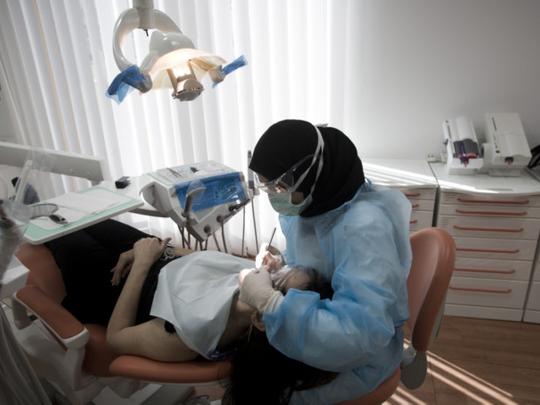
The UAE’s medical tourism market, estimated at $1.6 billion (Dh5.87 billion) in 2012, is set to grow by 7 per cent in 2013, according to market researcher Euromonitor. The country is armed with accredited medical institutions, new regulations that promote health-care practices and strong marketing.
Now, the formation of a group in the first quarter of 2013 will spearhead health tourism efforts in Dubai. “Global revenue from medical tourism is estimated to be $30 billion and Dubai, as an emerging destination for health care and tourism, is taking an increasing share of this. In 2012, health tourism in Dubai generated $1.6 billion with this figure expected to increase in 2013,” Marwan Abedin, Chief Executive Officer, Dubai Healthcare City, tells GN Focus.
“The government is in the process of creating a health tourism board or group, comprising Dubai Health Authority (DHA), Dubai Healthcare City (DHCC) and the Department of Tourism and Commerce Marketing (DTCM). This is in line with the health tourism initiative launched following an announcement by Shaikh Hamdan Bin Mohammad Bin Rashid Al Maktoum, Crown Prince of Dubai and Chairman of the Dubai Executive Council, which aimed to establish the city as a global health tourism hub,” he says.
Medical visas
A holistic approach may pay off. Already, overseas patients seeking treatment in Dubai can avail of a three-month medical tourist visa, extendible twice for up to nine consecutive months, in what is a phased initiative by DHA and the General Directorate of Residency and Foreigners Affairs (GDRFA). Last year, DHA and GDRFA met with private sector hospitals to inform them about application procedures for a medical tourism visa, available to hospitals that already have or are in the process of securing international accreditation such as the Joint Commission International (JCI).
The visa has been in place since 2008 and is issued to hospitals that sponsor patients and their accompanying family members. Plans now include extending it to specialised clinics, spas and wellness centres.
Thomas Murray, CEO, American Hospital Dubai, one of the JCI-accredited facilities in Dubai, says patients are using the medical visa already. “The hospital is making every effort to ensure that patients are able to stay in the UAE for the duration required for the necessary health-care service to be completed,” he says.
Whether with the medical visa or the standard visit visa, he says, in 2011, the hospital’s Total Joint Replacement (TJR) Center of Excellence performed more than 1,000 surgeries on patients from 20 countries; 40 per cent of these patients were from outside the UAE.
“The most active countries for international patients for the American Hospital Dubai are Kuwait, Qatar and Saudi Arabia in the GCC, as well as Nigeria. Among these international patients, neurosurgery, cardiothoracic surgery, cardiovascular interventions and surgery, ophthalmology and retinal services and orthopaedic arthroscopy are all prominent, in addition to total knee and joint replacements,” Murray says.
In Ras Al Khaimah, RAK Hospital has been active in medical tourism as well. Packages for visiting tourists include airline tickets, visitor visas and negotiated rates at partner hotels nearby.
Strategic location
One of the many advantages that the UAE enjoys is its location. Given its reputation as a well-regulated host destination for international institutions, the future for health care from the world’s leading players is here. Mubadala Healthcare, which is a division of a strategic investment company owned by the Abu Dhabi government, for instance, has partnered with US-based Cleveland Clinic to open a 360-bed facility in the capital in the third quarter this year. In partnership with Brussels University for treatments and services, Burjeel Hospital opened in Abu Dhabi last April.
In Dubai, the Saudi German Hospital is well established but future developement plans include a medical tower with 215 leased clinics and six specialised medical centres.
Perhaps because of the wide mix of expatriates living here, the UAE has also emerged as a centre for alternative medicine. “We now have clinics offering Eastern medicine, Chinese medicine and other alternative medicines opening here,” says DHCC’s Abedin.
Examples from DHCC include Atlas Spinal Center, Beijing Tong Ren Tang Gulf, California Chiropractic Center, Dr Batra’s Homeopathic Clinic and The Hundred Pilates Studio.
Having internationally recognised hospitals is the first step towards attracting patients from across the world. Marketing is the next step. RAK Hospital has opened small offices in countries such as Iraq, Afghanistan, Ethiopia and Nigeria to find out more about the kinds of patients who are travelling abroad for treatment.
“The agenda is to work with our partners to develop a suitable strategy to attract patients from the region to come to Dubai. We are looking at the GCC, India, Pakistan and Russia, as well as Africa. We are going to be travelling with the medical group to these international sectors to actively market Dubai,” Abedin says.
While some insurance providers already allow their clients to be treated overseas, as medical tourism grows, regulations both here and in key source markets will need to evolve to keep up.
According to Euromonitor, “A number of health-care providers, including the director of Al Noor Hospital, believe that the country’s legislation needs revising in this area due to a lack of legal contracts between patients and health-care providers. The government is thus expected to revise its health-care legislation in this area.
“The Dubai Health Authority plans to launch a set of guidelines and a categorisation system for health-care providers in this area.”












